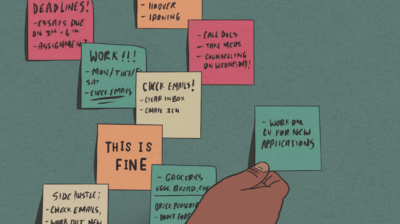Finding a balance to avoid burnout in a hyperproductive world
Hear how Beth navigates the world of hustle culture and hyper-productivity to avoid burnout.

It was the third day of my COVID-19 isolation. I was fortunate that I hadn’t become seriously ill, but I was under the weather and stuck in bed. There I was, sick, stuck in my room, feverish and dizzy. Yet, the only thing I could think about was how much work I had to get done. Before isolation, I had been placing myself under a lot of pressure- academically and with extracurriculars- and now I was frustrated with my inability to maintain this level of work and productivity.
I’m sure this is a familiar story. Even when COVID-19 lockdowns first hit, there was an explosion of productivity culture online. While we entered lockdown and began to see the impacts of the pandemic, there was a message that this time had to be used to be productive. We were told to do more work than ever before, be increasingly available, and yet the focus on minding our welfare and processing what the world was going through was minimal.
As I went through the Leaving Certificate and started university, with intermittent lockdowns and online school, I became increasingly aware of this “hustle culture” and hyper-productivity. This is where you allow your career, or school, to take over your life to the extent that other aspects of your life- your friends, hobbies, and rest- take a back seat.
I felt like I always had to be doing a billion things, and that to simply exist was wasting time. When I did take breaks, all I could focus on was the feeling that I wasn’t doing enough. A quick scroll through TikTok will show endless videos encouraging you to monetise your time, to develop work schedules of 15-16 hours a day, and to work to the point of burnout. Burnout is a feeling of mental and physical exhaustion and can take the joy out of your relationships, work and other areas of your life. This working culture can create the perfect conditions of stress and exhaustion to lead to this state which, once entered, can be tricky to get out of.
Balancing act
Don’t get me wrong, hard work is a great and important thing. It’s what allows us to challenge ourselves, to put effort into something we’re passionate about, and to make a change. However, there’s a crucial balance to strike between a good work ethic and pursuing a variety of passions, and overextending oneself or placing unrealistic expectations on yourself. It’s great to take on a variety of work and projects and to dedicate yourself to the things that are important in your life. But once you start expecting perfection 100% of the time, or you lose the ability to take a genuine break, that’s when you run into trouble.
Society’s measure of worth
Society’s expectations also feed into these burdens that young people experience. People are expected to work and work and take on more until they hit a wall. When they hit that wall, the support offered is inadequate. The support to prevent this burnout in the first place is even scarcer. Our time is viewed as something that can and should be monetised.
Hyper-productivity culture as I’ve outlined is rooted in the belief that our value derives from our productivity, from the work we contribute rather than our inherent value as human beings. If we attach our sense of worth to how productive we are, we’re placing it on something external that is constantly fluctuating. It also feeds into the belief that our worth is something that can be measured at all. Ultimately, this focus on productivity and unsustainable levels of work lead to burnout.
I’ve particularly noticed the impact this has on young people this year, as I left school and started university. The adjustment has meant reshuffling commitments, reassessing capacity, and understanding that schedules and commitments are fundamentally different in university. However, this shift and the reduction in capacity in the first year of university can bring with it a sense of guilt and a desire to push yourself beyond your limits.
Allowing time to adjust
This is how I’ve seen many friends hit a point of burnout in their first term of university. It’s a time for adjusting to an entirely new phase of life, making new friends and, for many people, learning how to navigate the world entirely independently. Placing unrealistic and unfair burdens on yourself during an already difficult period is a recipe for burnout and exhaustion. When we’re fed this message of constant productivity, and to tie our worth to it, this can become almost inevitable.
I need to be able to simply “be” from time to time. The breaks I take will ultimately enhance the time in which I am working, as my body and mind will have had time to recoup and won’t be pushed to the point at which I can no longer do anything. We need a healthy balance between time to work, study, do extracurriculars, see friends, and simply exist. When was the last time you took even 15-20 minutes to yourself, without thinking about what you had to get done with the rest of your day?
At a larger level, we also need to rethink our productivity culture as a society. We need to encourage and support one another to take breaks, to save time and energy for our relationships and hobbies. We need to separate productivity from a sense of personal worth while still finding fulfilment in our work and studies. Essentially, we need to find that balance between hard and fulfilling work and an unsustainable culture that places unrealistic expectations on young people – leading to burnout.
Feeling overwhelmed and want to talk to someone?
- Get anonymous support 24/7 with our text message support service
- Connect with a trained volunteer who will listen to you, and help you to move forward feeling better
- Whatsapp us now or free-text SPUNOUT to 50808 to begin.
- Find out more about our text message support service
If you are a customer of the 48 or An Post network or cannot get through using the ‘50808’ short code please text HELLO to 086 1800 280 (standard message rates may apply). Some smaller networks do not support short codes like ‘50808’.






